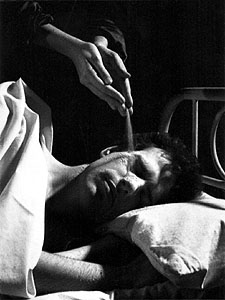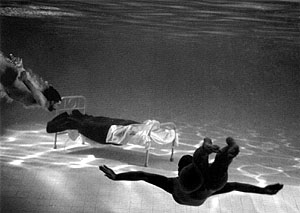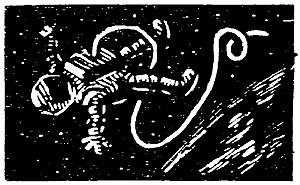| 
 The
River Rolls: The
River Rolls:
Understanding A Momentary Lapse of Reason
by
Dave Ward
 Pink
Floyd’s 1987 release, A Momentary Lapse of Reason,
is among the least examined, most misunderstood albums in the
entire Pink Floyd canon. Pink
Floyd’s 1987 release, A Momentary Lapse of Reason,
is among the least examined, most misunderstood albums in the
entire Pink Floyd canon.
Many Floyd fans still dismiss
the album out-of-hand, primarily because Roger Waters disapproves
of it. This quick dismissal is often validated by other criticisms:
That the lyrics are poorly written, that there is no concept behind
it, that it lacks the “tooth” of previous Floyd albums,
or that it was an insincere effort to imitate the past glories
Pink Floyd had already achieved.
A Momentary Lapse of Reason deserves to be judged, for
good or bad, by the actual content of the album. To test the traditional
criticisms of the album, let’s take a closer look at the
lyrics—and the artwork as well—from A Momentary Lapse
of Reason.
The album opens with sound effects. Of course, it’s neither
the first nor last time nonmusical sound effects opened a Pink
Floyd album. For examples, Meddle opens with howling winds,
Dark Side of the Moon opens with a heartbeat, The Final
Cut opens with radio sound effects, and The Division Bell opens with radio telescope sounds.
A Momentary Lapse opens with the sound of rowing on a
river: paddle splashing, the oars creaking. At 1:15 into the song,
we hear Nick Mason recite some words:
When the childlike view of the world went,
Nothing replaced it... I do not like being asked to... Other
people replaced it—
Someone who knows.
It’s impossible to apply an interpretation to so few words
without very uncertain, risky speculation. The words could possibly
be about Syd Barrett, the original shining star of Pink Floyd. Barrett
certainly had a childlike view of the world, expressed in his lyrics,
innocent and playful—yet sometimes dark, lonely and world-weary.
When Barrett’s childlike view left him as his latent schizophrenia
asserted itself, certainly nothing replaced it. The “nothingness” of Barrett’s mental illness is addressed in previous Pink Floyd
songs such as “Shine On You Crazy Diamond” in which this
absence is compared to “black holes in the sky.” The film which accompanies “Signs of Life” in concert
offers possible further clues. A man rows a boat on a river. The
camera angle sometimes sinks below the surface of the water, showing
the green murkiness which lies beneath.
Rivers, and bodies of water in general, are a virtually universal
symbol of the unconscious aspects of the mind: artistic creativity,
latent emotions, and impulses within us that motivate us without
our notice or control.
Barrett himself used drowning in water as a symbol of his own
internal turmoil in “Astronomy Domine.” In those lyrics,
“the blue you once knew” references the blue skies which
he would no longer see—the blue sky itself being a metaphor
for happiness and contentment. Barrett describes an underwater
struggle, a struggle which is of himself against himself.
This same struggle was depicted by the post-Barrett Floyd in
a film which accompanied live performances of “Shine On You
Crazy Diamond.” That film, a blatant allegory for Barrett’s
story, depicted Barrett plunging into a deep pool and fighting
himself underwater.
It’s entirely possible that the film for “Signs of
Life”—made by Storm Thorgerson, who also made the “Shine
On” film—is intended to suggest Barrett again.
Yet, as compelling as it is to apply a Barrett reference to
these few words from “Signs of Life,” we have to acknowledge
that there is simply too little here to be at all certain of the
reference or meaning. It could just as well be about many other
things.
The second song on A Momentary Lapse of Reason is “Learning
to Fly.” The lyrics are the most refined on the album, more
focussed than “Yet Another Movie” and less redundant
than “Sorrow.” “‘Learning to Fly’ is about breaking free and
the actual mechanics of learning to fly an airplane,” Gilmour
said in the December 1987 issue of Only Music. It is widely
understood that on another level this flight is a metaphor for
spirituality and independence.
This is brought into focus by the story video for the song.
Drawing from a Native American tale, the video depicts a young
man who, with the encouragement of a Native American elder shaman,
leaps from a cliff and is transformed into an American Bald Eagle.
But flight and spiritual independence is not the only meaning.
The lyrics also deal with persistence and perseverance. The subject
of the song sees that “ice is forming on the tips of my wings.” Any aerophile knows that ice on the wings of an aircraft is potentially
deadly, and is something pilots must constantly fight. The ice
here is serving as a metaphor for anything which holds a person
back, particularly their own inner doubts and fears which can
cause hesitation or stalling.
Despite the ice, the pilot still flies “above the planet
on a wing and a prayer.” Seemingly the pilot overcomes the
ice and flies anyway, achieving “suspended animation, a state
of bliss.” Where “Learning to Fly” is a song of encouragement
and victory, “Dogs of War” moves directly into Roger
Waters’ own territory: scathing anti-corporate, antiwar lyrics
with hints of socialism.
“Dog of War” could, in some ways, be compared to “Dogs” from the Animals album. In both songs, corrupt back room
wheeler-dealers are portrayed as vicious dogs who kill in order
to gain more power.
In “Dogs” the corrupt individuals are specifically
business men. The lyrics suggest that they are out to gain power
and money regardless of the cost inflicted on others who are weaker
than they. Waters also covers the eventual twofold demise of the
dogs: first he suggests that they will get old and fat, and finally
die of cancer, then later in “Sheep” he says that the
powerless will rise up and overthrow the dogs.
But in “Dogs of War” Gilmour is commenting on war-for-money
and the mercenary practices which became particularly common in
the mid-1980s. The “dogs” Gilmour addresses are politicians
and mercenaries. Gilmour’s dogs are not going to die as Waters’ dogs. In this case, “whatever may change, you know the dogs
remain.” The politicians make “invisible transfers and long distance
calls,” arranging for mercenaries to remove their political
opponents. The “laughter in marble halls” is that of
dealing between the apparently chummy politicians and mercenaries.
It is widely believed that in 1984 President Ronald Reagan of
the United States, with Lieutenant Colonel Oliver North, hired
mercenaries and drug smugglers to ensure that contras in Nicaragua
could keep receiving arms from the US, despite Congress outlawing
CIA-supplied arms in that year. There have been other allegations
of dealings between US politicians and mercenaries in the mid-1980s,
such as suggestions that mercenaries were trained for a planned
commando raid inside the Soviet Union.
It seems certain that “Dogs of War” is a reference
to the Reagan-era covert war dealings with Nicaraguan contras
and others.
 The
next song, “One Slip,” is one of the very few Pink Floyd
songs which addresses sexual relationships. If nothing else convinces
Roger Waters fans that A Momentary Lapse has merits, Gilmour
should at least get credit for handling the topic of relationships
in a challenging, uncomfortably honest manner which elevates “One
Slip” far above almost all other relationship songs in rock
‘n’ roll. The
next song, “One Slip,” is one of the very few Pink Floyd
songs which addresses sexual relationships. If nothing else convinces
Roger Waters fans that A Momentary Lapse has merits, Gilmour
should at least get credit for handling the topic of relationships
in a challenging, uncomfortably honest manner which elevates “One
Slip” far above almost all other relationship songs in rock
‘n’ roll.
“One Slip” is not ultimately about sex or love, but
about unintended consequences. In the song, a man spots a woman
across the room. Their eyes meet, and soon they are both giving
in to sexual impulses. A pregnancy results, as is subtly implied
with the words “soon the seeds were sown” and “the
year grew late,” as well as by the sound effects at the beginning
of the song which are a metaphor for sperm trying and then contacting
the ovum.
The “momentary lapse of reason” is a reckless sexual
indulgence, without protection, which “binds a life to a
life” via the unplanned child. We know that “neither
one wanted to remain alone” as the pregnancy progressed, which
implies that if the pregnancy was unplanned, at least the man
involved was ready to take responsibility.
Although popular when the album was new, “On the Turning
Away” may be a bit more lyrically facile than anything else
on the album. The song is essentially a simple political commentary
urging compassion and a return to humanity and consideration for
others around us who are in need.
“‘Turning Away’ is about the political situations
in the world,” Gilmour said in the December 1987 issue of
Only Music. “We have these rather right-wing conservative
governments that don’t seem to care about many things other
than looking after themselves.” It’s a theme which has been addressed countless times,
from “We Are the World” to Rush’s “Closer to
the Heart.” Gilmour hasn’t done anything particularly
new here. Phrases like “using words you will find are strange/
mesmerized as they light the flame” seem unfocussed and disposable,
adding nothing in particular to the song except nice-sounding
combinations of words.
And yet, it has to be said in the song’s favor that “On
the Turning Away” still manages to come off as more mature
and sophisticated than either “We Are the World” or “Closer
to the Heart,” or indeed most other songs urging brotherly
compassion. (Although to be fair to Rush, Neil Peart was only
about 20 years old when he penned those lyrics, whereas Gilmour
was double that age upon writing “On the Turning Away.”)
“Yet Another Movie” is the most unfocused, vague lyric
on the album, but this is not necessarily a bad thing. The lyrics
depict little emotional incidents and images as if viewed on a
screen, perhaps from a detached perspective—a stark contrast
to the emotional connections urged by the previous song.
“It’s a more surrealistic effort than anything I’ve
attempted before,” Gilmour said in the December 1987 Only
Music. “Surreal” is an apt term for the song, where
images jump quickly from a running man, to a crying child, to
deceived women, to the sun, and and empty bed—all that in
just one of the six verses!
“I don’t even know what all of it means myself!” Gilmour has admitted.
I’m not convinced that there really is a meaning in “Yet
Another Movie,” nor that there should be a meaning.
The song appears to be simply a collection of succinct lyrical
snapshots, like glimpses of scenes while flipping quickly through
television channels. There doesn’t seem to be any one consistent
theme within the verses. It could be that the song is simply poetry
for the sake of poetry, with meaning being entirely irrelevant
to the purpose of this particular effort.
 “Round
and Around,” the instrumental coda to “Yet Another Movie,” is impossible to analyze as it has no lyrics. It probably is simply
a nice instrumental with no message or meaning intended. The only
suggestions we have come from the title and a small woodblock
engraving which illustrates the song in the A Momentary Lapse
of Reason songbook. The tiny picture depicts an astronaut
with a Gemini-era spacesuit tethered for a space walk in orbit.
Taken with the title, space flight and orbit is implied. But there
is no ground for reading much into that. The track is best enjoyed
as the unusual 5/4 meter instrumental it is. “Round
and Around,” the instrumental coda to “Yet Another Movie,” is impossible to analyze as it has no lyrics. It probably is simply
a nice instrumental with no message or meaning intended. The only
suggestions we have come from the title and a small woodblock
engraving which illustrates the song in the A Momentary Lapse
of Reason songbook. The tiny picture depicts an astronaut
with a Gemini-era spacesuit tethered for a space walk in orbit.
Taken with the title, space flight and orbit is implied. But there
is no ground for reading much into that. The track is best enjoyed
as the unusual 5/4 meter instrumental it is.
“A New Machine, Parts 1 and 2” are often misinterpreted
by fans who are eager to read comments about Roger Waters or the
band itself into the lyrics. It has been previously suggested
that the lyrics may related to Nick Mason’s lack of confidence
when he first rejoined Gilmour. The lyrics have also been misinterpreted
as saying that the band Pink Floyd is a machine.
In fact, the simple lyrics to “A New Machine, Parts 1 and
2” delve into one of the richest areas of myth and metaphor:
the metaphor of The Wasteland.
In his poems “The Wasteland” and the more succinct
“The Hollow Men,” T.S. Eliot used deserts and detached
eyes as images representing an empty, unfulfilling life. The same
idea has been touched on in countless myths, legends, and poems:
loss of power over one’s own life, impotency to control one’s
own destiny, and losing touch with your passions and your bliss.
The theme runs in a sharp contrast against the joy and freedom
of self-direction covered in “Learning to Fly” earlier
in the album.
“A New Machine” depicts the subject as trapped within
the limitations of a body, seeming to look forward to death and
escape. This is not unlike the Buddhist and Hindu belief that
life is all sorrow, and the ultimate goal is to escape that cycle
of suffering. However, the Buddhists and Hindus believe in reincarnation,
and that escape is finally achieved by mastering moral and spiritual
goals. “A New Machine” depicts the longing for escape,
but not any particular method.
In “The Hollow Men,” Eliot uses references to the eyes
of “hollow men” to repeatedly express fear of death,
unwillingness to confront others’ suffering, and to bring
attention to the cold detachment in which he felt people are living,
with little compassion or connection to each other.
Gilmour similarly states, “I have always looked out from
behind these eyes,” suggesting that the subject is actually
within or behind the physical body, and the body is not who he
(or she) is. Where Eliot uses eyes to describe the detachment
between people, Gilmour uses eyes to emphasize one’s detachment
from one’s own self, a sort of spiritual vacancy.
Where Eliot describes a fear of death and unwillingness to confront
it, Gilmour’s subject looks forward to the day of death,
as if the real “self” will be freed when the body is
shed.
 It’s
possible to speculate a comparison between “A New Machine” and the later Floyd song “What Do You Want From Me.” As in the latter song, “A New Machine” could potentially
be interpreted as a protest against the demands of his fans and
the music industry who would apparently like Gilmour to simply
keep churning out songs and touring, at the expense of his own
personal life and other things that may be important to his own
happiness. It’s
possible to speculate a comparison between “A New Machine” and the later Floyd song “What Do You Want From Me.” As in the latter song, “A New Machine” could potentially
be interpreted as a protest against the demands of his fans and
the music industry who would apparently like Gilmour to simply
keep churning out songs and touring, at the expense of his own
personal life and other things that may be important to his own
happiness.
“Terminal Frost” is the third and final instrumental
on A Momentary Lapse of Reason, and is also the longest
instrumental of the album. As with “Round and Around,” there is no significant content by which to discern any particular
meaning or message behind the song. The title alone is not enough.
Even the photograph accompanying the song in the song book fails
to suggest any meaning clearly. It is probably best enjoyed for
what it is: an excellent instrumental, atypical of anything Pink
Floyd had ever done before.
The final song of the album is “Sorrow.” Although it
is in some ways lyrically redundant, it is the pinnacle of the
underlying imagery which pervades the entire album.
“Sorrow” addresses a longing for past glories. The
setting of the song appears to be a post-apocalyptic world, but
this is unclear. It could as well be set in the present, with
its reference to air pollution and oil spills. “‘Sorrow’ is a bit of a lost paradise,” Gilmour said in Only Music,
December 1987.
At its heart, “Sorrow” is another step into T.S. Eliot’s
imagery. Eliot uses an arid wasteland as a metaphor for spiritual
death and joylessness. Gilmour’s wasteland has plenty of
water in the form of rivers and seas, but the air and water are
polluted. The subject of the song is clearly hopeless, being “chained
forever to a world that’s departed.” Near the end of “The Hollow Men,” Eliot describes a
“shadow” which comes between the intentions behind an
action and the actual result. In this and other works, Eliot often
addressed impotency in one’s own life, an inability to turn
ambition into achievement. Likewise, in “Sorrow” Gilmour
describes the subject’s similar paralysis, with curdling
blood, trembling knee, weakening hand, and faltering step.
And what of an underlying theme in the album? A Momentary
Lapse of Reason is not a concept story-album in that the songs
do not collectively form a plot to tell a single story. However,
the imagery of water—particularly rivers—appears in
almost every lyric.
The album opens with a boat being rowed during “Signs of
Life.” In “Learning to Fly” the runway is likened
to a river, and there is a minor reference to the subject’s
“watering eye.” The Storm Thorgerson photograph illustrating
“One Slip” depicts a man and woman underwater swimming
toward a submerged bed. “Yet Another Movie” refers to
an empty bed (which for the cover became a pun on “river
bed”) as well as “the babbling that I brook” and
another mention of tears. “Sorrow” is full of multiple
mentions of rivers, to the point of being a bit redundant. Even
in “Dogs of War” the dogs are seen running through the
water on a beach.
 “Originally
we wondered whether we ought to be looking for a concept album
and if things should be linked together,” Mason said in the
December 1987 Only Music. The band made some effort to
find a common topic, but couldn’t construct anything satisfactory. “Originally
we wondered whether we ought to be looking for a concept album
and if things should be linked together,” Mason said in the
December 1987 Only Music. The band made some effort to
find a common topic, but couldn’t construct anything satisfactory.
Gilmour later told Rolling Stone magazine in its 19 November
1987 issue, “We thought, ‘Sod this, we don’t have
to make a concept album. If we work on making everything great,
then maybe it will show itself to have some sort of linear form
later.” “We decided the atmosphere was the most important thing,” Bob Ezrin told Rolling Stone. “The concept really
just had to be a feeling that was pervasive.” Gilmour’s studio where much of A Momentary Lapse was written and recorded is located aboard the houseboat The Astoria,
which is moored on the River Thames. As the wrote and recorded,
the water was ever-present just outside the boat’s small
windows. That river found its way into many songs throughout the
album.
“The river became the motif,” Ezrin told Rolling
Stone. “It came up in all the songs. The river imposed
itself.” Storm Thorgerson was well aware of the river’s influence
on the album. In turn, he strengthened that concept which unified
the songs into a whole. Thorgerson filled the visual elements
with additional water references: boats being rowed on a river,
dogs running through the surf, swimmers approaching an underwater
bed... and of course, hundreds of empty beds along a shoreline.
Fans have been too eager to misunderstand and dismiss A Momentary
Lapse, seeing little meaning, and trying to force artificial
references to Roger Waters where there are none. Pink Floyd would
address their former bandmate Waters in several songs on their
next studio album, The Division Bell, but there is not
a single reference to Roger Waters on A Momentary Lapse of
Reason.
In retrospect, it is only the absence of a more firm concept
which makes the album slightly odd in the Pink Floyd discography.
Every album since Dark Side of the Moon has had a firm
concept, A Momentary Lapse being the sole exception. (Some
would argue that The Division Bell also has no firm concept,
but in the case of that album, there is some grounds for debate.)
Despite the swift dismissal A Momentary Lapse has been
granted by fans of Roger Waters and fans of Waters’ influence
over the band, there is really little ground for dismissing the
album out-of-hand. There is nothing to suggest any of the songs
are anything less than heartfelt. The lyrics, though not perfect,
are rich with multiple layers of meaning and timeless literary
themes. The album is not without fault, but it is certainly not
the fraud or failure which many claim it to be. It’s a far
more quirky album than we might tend to remember, and that is
a good thing.
Looking back on A Momentary Lapse of Reason nearly 14
years after its initial release, it becomes clearer what the album
was: David Gilmour and Nick Mason hoisting the Pink Floyd banner
without Roger Waters for the first time, testing the winds and
trying to find their footing.
A Momentary Lapse was to the post-Waters Floyd precisely
what A Saucerful of Secrets was to the post-Waters Floyd:
a very strong first effort from a band who had just lost their
creative catalyst and was experimenting in order to find out how
to strike out on their own.
In hindsight, A Momentary Lapse appears to be not only
a success in terms of sales and concert attendance, but also a
great artistic victory. It certainly deserves a fresh look, and
a renewal of acceptance from all Pink Floyd fans.
Dave Ward is a
contributor to Spare Bricks
|